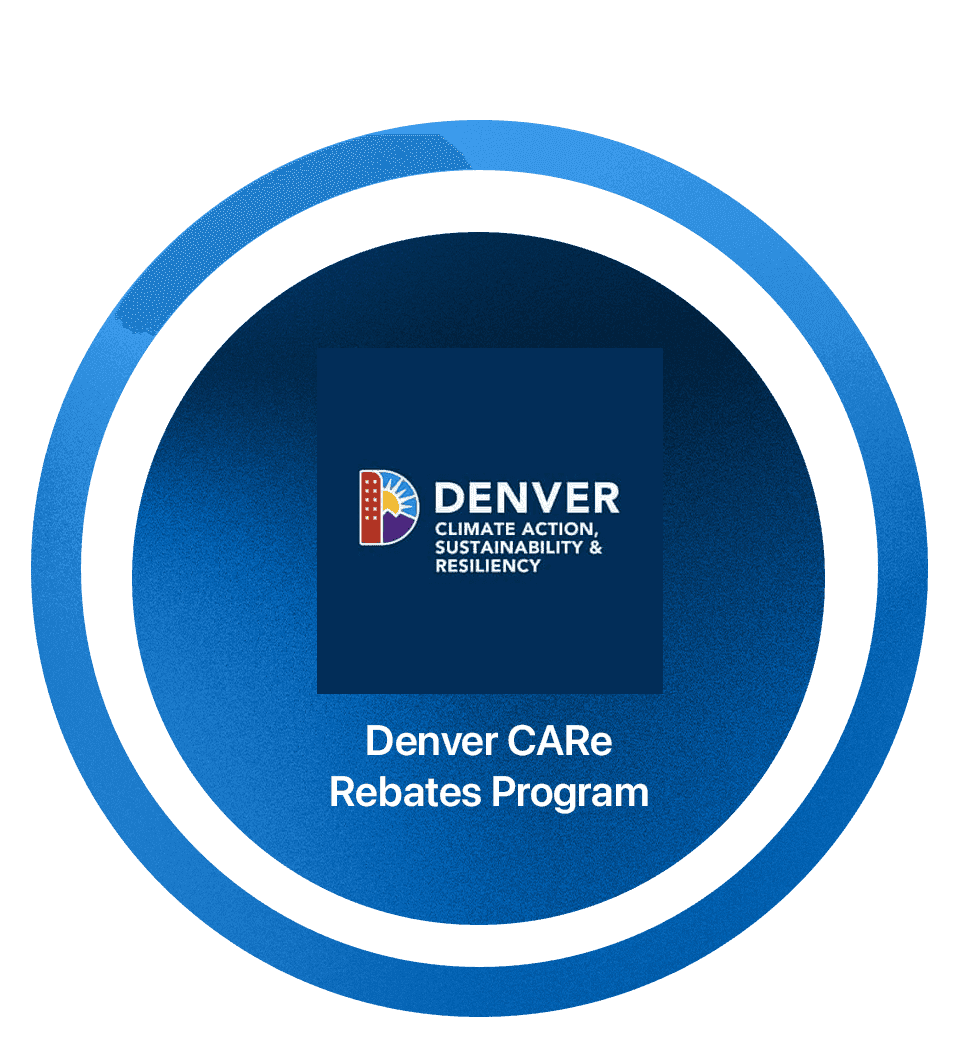Denver Heat Pump Rebates
Denver CARe ended in May 2025, but you can now save more than it ever offered. Stack Xcel, HEAR, and state programs for $7,750 to $15,750 in rebates.
Updated February 9, 2026•By Editorial Staff
Denver CARe ended in May 2025 after all rebates were fully subscribed. Current programs offer more: Xcel Energy ($6,750+ for cold climate heat pumps), HEAR (up to $8,000 for income-qualified households), and the Colorado state tax credit ($1,000). Total: $7,750 to $15,750, applied as upfront discounts rather than tax returns. DRCOG adds more mid-2026.
Denver CARe
Ended May 2025
Current Max
$15,750
Base Savings
$7,750
Programs
3 Active Now
Blue can make mistakes. Check important info.
Denver CARe Amounts (Historical)
For reference. This program ended May 2025. Current programs above offer more.
| Denver CARe Equipment (Ended) | Was | Details |
|---|---|---|
| Cold Climate ASHP | $1,200 | |
| Cold Climate MiniSplit | $1,200 | |
| Electrical Upgrade | $1,000 | |
| Heat Pump Water Heater | $500 |
What's Available for Denver Homeowners in 2026

If you came here looking for Denver CARe rebates, you're in good company. This page still gets hundreds of visits each month. The program ended in May 2025 after all funds were claimed. Read the full story of why it ended.
You can now save more than CARe ever offered. Denver is 100% Xcel Energy territory. Every Denver homeowner with gas service qualifies for Xcel's rebates with no income check and no application lottery. Add the federal HEAR program if you're income-qualified, plus the Colorado state credit, and you're looking at $7,750 to $15,750 in savings.
That's more than the $14,500 max that was possible when CARe was running.
Denver Rebate Programs (2026)
| Program | Amount | Details |
|---|---|---|
| Xcel Energy | $6,750–$9,000 | |
| HEAR | Up to $8,000 | |
| CO Tax Credit | $1,000 | |
| DRCOG | TBD |
How to Stack Your Rebates

These programs stack. You're not choosing between them. You're combining them.
If you have Xcel gas service (and most of Denver does), you automatically qualify for Xcel's rebate. That's $6,750 for a typical 3-ton cold climate heat pump, applied as an instant discount. Add the $1,000 Colorado tax credit and you're at $7,750 without even checking your income.
If your household income is under 150% AMI (about $168,000 for a household of 2), you can add HEAR for up to $8,000 more. That's $15,750 total, applied upfront rather than as a tax return you wait for.
UniColorado handles all the paperwork. You sign a few forms, we submit everything to Xcel and the state, and your invoice reflects the discounted price from day one.
What Happened to Denver CARe
Denver CARe ran from 2021 to 2025. Funded by a 0.25% sales tax that Denver voters approved, it offered rebates on heat pumps ($1,200), electrical upgrades ($1,000), water heaters, and solar. The program was wildly successful, so successful that it ran out of money.
By March 2025, all heat pump rebates were fully subscribed. The program officially ended in May 2025 after achieving its goal: accelerating Denver's transition to electric heating. UniColorado helped hundreds of Denver homeowners through this program.
What's Coming Next
The Denver Regional Council of Governments (DRCOG) is launching Power Ahead Colorado mid-2026. It's not a direct replacement for CARe. It's a regional program covering 58 communities across the Denver metro, backed by $273 million in federal funding through 2030.
Rebate amounts haven't been announced yet, but the program includes a low-income component offering free home upgrades worth an average of $20,000. For everyone else, we expect rebates that will stack with Xcel and HEAR.
If you're waiting for "the next Denver CARe," there's no need. The current programs already exceed what CARe offered, and DRCOG will only add more.
RebateStacking
Your Denver Savings
Real numbers for a 3-ton cold climate heat pump.
Any Denver Homeowner
Xcel gas customer, no income requirement.
Up to Total Savings
$7,750
Income-Qualified
Under 150% AMI (~$168K for household of 2).
Up to Total Savings
$15,750
Based on cold climate heat pumps (ccASHP/ccMSHP) at $2,250/heating ton. HEAR amounts depend on income level and household size.
Frequently Asked Questions
Was this page helpful?